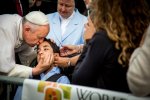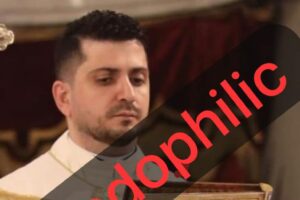Francis holds audience with participants in the Convention “… and you will always eat at my table!”, Promoted by the Italian national catechetical office disabled persons’ section. He responds to questions posed by two girls with disabilities: “Shaking hands is communion, but many think it is more convenient to ignore diversity”. To the priests who do not welcome he proposes “a pastoral ear”. The full text of this unscripted speech.
|
Vatican City (AsiaNews) – Diversity is not a limit but a resource, and priests who do not welcome or even reject the disabled would do better to close the door of their church, said Pope Francis during an audience with participants at the Convention “… and you will always eat at my table!”, promoted by the Italian national catechetical office disabled persons’ section. Francis responded off the cuff to two questions posed by two girls with disabilities, one on the value of diversity and the other on access to the sacraments for disabled people “sometimes kept away” from the Church. Below the full text transcribed and translated by AsiaNews. The first question was very, very enriching. Very enriching. And it was about diversity. We are all diverse. There is no one thing that is the same as another. And there are some diversities that are big, other smaller, but we are all diverse. And she, the girl who asked the question first, said: “We are often afraid of diversity”. It is scary. But why? Because an encounter with a person who is diverse, not badly so but perhaps very diverse, is a challenge. And every challenge provokes a certain fear. We prefer not to move, it is more convenient to ignore diversity and say “we are all the same, and if someone is not the same let’s leave them aside, we do not go to meet them”. It is the fear we feel when faced with every challenge: every challenge frightens, frightens us. It scares us. This cannot be! Instead diversity is a resource, because I have something and you have another one and these two [together] make something that is more beautiful and greater. And in this way we can move forward. Just think of a world where everyone is same. What a boring world. A boring world. True, there are diversities that are painful, we all know, those [diversities] that have roots in a disease … but those diversities too can help us, challenge us and enrich us. This is why we must never be afraid of diversity, it is the very path by which we improve. To be more beautiful and enriched. And how do you this? By pooling what we have. Pooling. There is a beautiful gesture that we humans make, a gesture we make almost unconsciously, but it is a very profound gesture: shaking hands. When I shake hands I pool what I have with what you have. If it is a sincere hand shake, I’ll give you what is mine and you give me what is yours. And this is something that does us all good. Move forward with diversity. Because diversity is a challenge but it makes us grow. They make us grow. And to think that every time I shake another’s hand, I give something of mine and I get something from them. And this also makes us grow. This is what comes to me in answer to the first question, thank you. I forgot something in the first question, but I will answer it now together with the one Serena asked. Serena has put me in a difficult position. Because if I say what I really think … And she said very little, three or four lines. But what she said was strong. Serena spoke of one of the ugliest things, the ugliest that there is among us: discrimination. It is a terrible thing. “You’re not like me, you go over there and I will go here.” But I would like to do some catechesis, but not in this parish no. This parish is for those who look alike, where there are no differences … is this a good thing or not? What should the pastor do? Convert! It is true that if you want to go to Communion, you must be prepared, but if you do not know this language – maybe you’re deaf – you have to have the opportunity in this parish to prepare with sign language. That’s important. If you’re different, you also have the opportunity to be the best. And that is true! Diversity does not mean that those who have the five senses that work well are different from the deaf-mute: this is not true. We all have the same chance to grow up, get going, love the Lord, understand the Christian doctrine. We all have the same opportunity to receive the sacraments, do you understand? When, many years ago, a hundred years ago or more, Pope Pius X said Communion should be given to children, many were offended. “But that child does not understand, he’s different. He does not fully understand. ” Give Communion to the children, the Pope said, and he made a difference an equality. Because he knew that the child understands in another way, and when there are differences between us of course things are understood in another way. But also in schools, neighborhoods, everyone has their own richness. It is different, it is as if he were speaking another language, but it is diverse. It is diverse because it is expressed in a different way, and this is an asset. Because what you said, Serena, happens so many times, is one of the ugliest things in our cities, in our lives: discrimination. With offensive words, too. And you cannot be discriminated against. Each of us has a way of knowing things, that is different. One knows in a way, one in another. But everyone can know God. [A little girl gets up from the audience and begins to climb the stairs to the Pope, who stops speaking] Come, come, come … This little one is courageous, not afraid, takes risks. She gave us a lesson. This one will never be discriminated against, she is capable of defending herself. In the parish, in the Mass, the sacraments, all are equal because they have the same Lord Jesus and the same mother, Mary. [A second child comes to the Pope, kisses him and sits down at his feet together with the first]. How do we welcome everyone. But, if you – I do not say to you, I know you welcome everyone – but think of a priest who does not welcome everyone. What advice would the Pope give him? Close the door of the church, please: either everyone or no one! Think of the priest who defends himself: “No father is not so, I cannot accept everyone because they are not able to understand.” It’s you who are not able to understand! What a priest, helped by lay people, catechists and by so many people, needs to do is to help everyone understand. Understanding faith, love, how to be friends, differences how they complete things, how one can give one thing and another something else. This is to helping to understand. You have used two beautiful words: welcome and listen. Welcome, that is, to receive everyone. Receive everyone, everyone! And listen to everyone. I tell you one thing. Today I believe that in the Churches’ pastoral work there are so many beautiful things, so many good things. But there’s one thing we need to do more, even the priests and lay people but especially the priests: the apostolate of the ear, listening. “But Father, it is boring to listen to people, always the same stories.” But they are not the same people, and the Lord is in the heart of all people. And you must have the patience to listen, welcome and listen. I believe that with this I have answered the questions. I had prepared a speech, the Prefect will deliver it so you can all have it. It’s a bit boring to read a speech. And there comes a time, beware: when one begins to read a speech, some… with a certain cleverness, start watching the clock, as if to say “when will he end?”. The speech is to be read, or for you to read. Thank you so much for this visit, for this beauty of diversity that make communities. Something from one, another thing from another. Thank you very much and pray for me. |

















